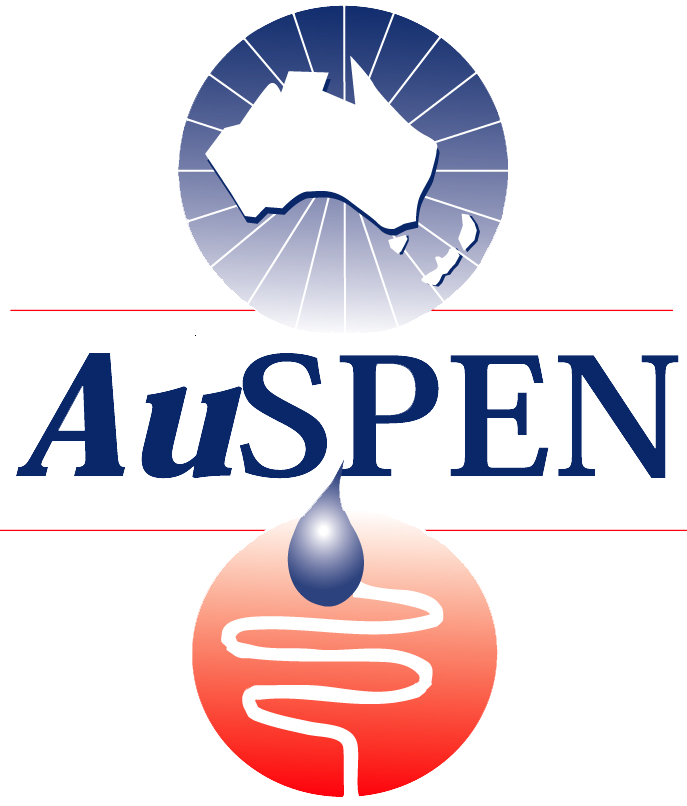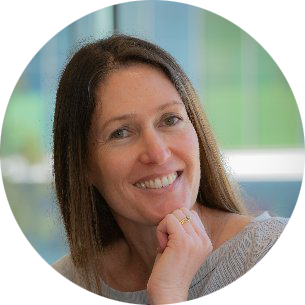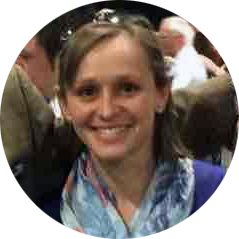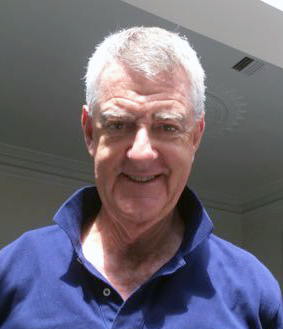AuSPEN - Insights in Clinical Nutrition
Welcome to the Insights in Clinical Nutrition Podcast - brought to you by AuSPEN and Fresenius Kabi.
We are your hosts – Brydie & Emily, Accredited Practising Dietitians from Australia.
This podcast takes you on a deep dive into evidence-based nutrition and what it means to be a nutrition professional. We don’t have all the answers, so in each episode, we will deliver insightful conversations with nutrition leaders who help us navigate the ever-changing world of clinical nutrition. Together, we will find the answers to your questions, shine a spotlight on our nutrition colleagues and help you create an impact on your nutrition career.
In our first season, we will introduce you to the experts behind AuSPEN (the Australasian Society for Parenteral and Enteral Nutrition), hear their stories and learn from their expertise.
In our second season, we will introduce you to leaders in clinical nutrition in a range of areas, including Oncology, Enteral and Parenteral Nutrition, hear their stories and learn from their expertise.
Please note that the information shared in this podcast is for educational purposes only and does not constitute medical advice.
Email: podcast@auspen.org.au
Thank you to our podcast sponsor Fresenius Kabi.
Listen Here:
Season 2, Episode 1: Oncology (Part 1)
This episode released on Monday 12th September 2022
Today in our first episode of Insights in Clinical Nutrition, we talk with special guest Associate Professor Nicole Kiss. Nicole is an advanced APD with more than 20 years’ experience in cancer nutrition including clinical, research and health service management positions.
Nicole is a Clinical Associate Professor and Victorian Cancer Agency Clinical Research Fellow in the Institute for Physical Activity and Nutrition at Deakin University and co-leads the Exercise and Nutrition for Cancer research group. Nicole’s research interests include interventions to optimise nutritional and functional outcomes during and after cancer therapy with a particular focus on body composition.
Season 2, Episode 2: Oncology (Part 2)
This episode released on Monday 19th September 2022
Today in our second episode of Insights in Clinical Nutrition, we continue talking with special guest Associate Professor Nicole Kiss. Nicole is an advanced APD with more than 20 years’ experience in cancer nutrition including clinical, research and health service management positions.
Nicole is a Clinical Associate Professor and Victorian Cancer Agency Clinical Research Fellow in the Institute for Physical Activity and Nutrition at Deakin University and co-leads the Exercise and Nutrition for Cancer research group. Nicole’s research interests include interventions to optimise nutritional and functional outcomes during and after cancer therapy with a particular focus on body composition.
Season 2, Episode 3: Enteral Nutrition (Part 1)
This episode released on Monday 3rd October 2022
Today in our third episode of Insights in Clinical Nutrition, we talk with 2 special guests Lisa Murnane and Kate Hamilton. Lisa Murnane is a senior dietitian and leads the enteral and parenteral nutrition service at Alfred Health, Melbourne.
She has a range of experience having worked in various acute clinical settings including intensive care, oncology and gastroenterology. As part of her work at the Alfred, Lisa is a credentialed PEG dietitian, which allows her to manage or change feeding gastrostomy tubes as part of the home enteral nutrition service. Lisa specialises in nutrition support for upper gastrointestinal surgery patients and is undertaking a PhD in the area of esophagogastric cancer surgery.
Kate Hamilton is a senior clinical dietitian at Austin Health in Melbourne. Kate has almost 20 years of clinical experience and specialises in Critical Care, Liver and Intestinal Transplant and Home Parenteral Nutrition. Kate is the Austin’s nutrition support lead and is advance practice credentialled in gastrostomy tube management.
Season 2, Episode 4: Enteral Nutrition (Part 2)
This episode released on Monday 10th October 2022
Today in our fourth episode of Insights in Clinical Nutrition, we continue talking with 2 special guests Lisa Murnane and Kate Hamilton. Lisa Murnane is a senior dietitian and leads the enteral and parenteral nutrition service at Alfred Health, Melbourne.
She has a range of experience having worked in various acute clinical settings including intensive care, oncology and gastroenterology. As part of her work at the Alfred, Lisa is a credentialed PEG dietitian, which allows her to manage or change feeding gastrostomy tubes as part of the home enteral nutrition service. Lisa specialises in nutrition support for upper gastrointestinal surgery patients and is undertaking a PhD in the area of esophagogastric cancer surgery.
Kate Hamilton is a senior clinical dietitian at Austin Health in Melbourne. Kate has almost 20 years of clinical experience and specialises in Critical Care, Liver and Intestinal Transplant and Home Parenteral Nutrition. Kate is the Austin’s nutrition support lead and is advance practice credentialled in gastrostomy tube management.
Season 2, Episode 5: Parenteral Nutrition (Part 1)
This episode released on Monday 17th October 2022
Today in our fifth episode of Insights in Clinical Nutrition, we talk with special guest Emma Osland. Emma is an Advanced Accredited Practicing Dietitian currently based at the Royal Brisbane and Women’s Hospital. Throughout her career to date, Emma has worked across a broad range of practice areas and is recognised for her expertise in the area of nutrition support.
Emma has taken a lead role in developing of AuSPEN’s Adult Trace Element and Vitamin Guidelines for adults requiring parenteral nutrition, and the AuSPEN Quality Framework for Home Parenteral Nutrition Provision. She is an active member of the AuSPEN HPN Model of Care working group, who are continuing to work towards laying the foundations required to establish a national model of care for HPN in Australia.
References:
1. Ambrose T, De Silva A, Naghibi M, Saunders J, Smith TR, Coleman RL, Stroud M. Refeeding risks in patients requiring intravenous nutrition support: Results of a two-centre, prospective, double-blind, randomised controlled trial. Clin Nutr ESPEN. 2021 Feb;41:143-152. doi: 10.1016/j.clnesp.2020.11.028. Epub 2021 Jan 8. PMID: 33487258.
2. Blaauw R, Osland E, Sriram K, Ali A, Allard JP, Ball P, Chan LN, Jurewitsch B, Logan Coughlin K, Manzanares W, Menéndez AM, Mutiara R, Rosenfeld R, Sioson M, Visser J, Berger MM. Parenteral Provision of Micronutrients to Adult Patients: An Expert Consensus Paper. JPEN J Parenter Enteral Nutr. 2019 Mar;43 Suppl 1:S5-S23. doi: 10.1002/jpen.1525. PMID: 30812055.
3. Dudrick SJ. History of parenteral nutrition. J Am Coll Nutr. 2009 Jun;28(3):243-51. doi: 10.1080/07315724.2009.10719778. PMID: 20150597.
4. Ferrie, S. (2019). Does infusion time affect the retention of parenteral trace elements? British Journal of Nutrition, 122(1), 56-62. doi:10.1017/S0007114519000965.
5. Klek S, Szczepanek K, Scislo L, Walewska E, Pietka M, Pisarska M, Pedziwiatr M. Intravenous lipid emulsions and liver function in adult chronic intestinal failure patients: results from a randomized clinical trial. Nutrition. 2018 Nov;55-56:45-50. doi: 10.1016/j.nut.2018.03.008. Epub 2018 Mar 22. PMID: 29960156.
6. Osland EJ, Ali A, Isenring E, Ball P, Davis M, Gillanders L. Australasian Society for Parenteral and Enteral Nutrition guidelines for supplementation of trace elements during parenteral nutrition. Asia Pac J Clin Nutr. 2014;23(4):545-54. doi: 10.6133/apjcn.2014.23.4.21. PMID: 25516311.
7. Osland EJ, Ali A, Nguyen T, Davis M, Gillanders L. Australasian society for parenteral and enteral nutrition (AuSPEN) adult vitamin guidelines for parenteral nutrition. Asia Pac J Clin Nutr. 2016;25(3):636-50. doi: 10.6133/apjcn.022016.05. PMID: 27440700.
8. Osowska S, Kunecki M, Sobocki J, Tokarczyk J, Majewska K, Omidi M, Radkowski M, Fisk HL, Calder PC. Effect of changing the lipid component of home parenteral nutrition in adults. Clin Nutr. 2019 Jun;38(3):1355-1361. doi: 10.1016/j.clnu.2018.05.028. Epub 2018 Jun 6. PMID: 29907355.
9. Rio A, Whelan K, Goff L, Reidlinger DP, Smeeton N. Occurrence of refeeding syndrome in adults started on artificial nutrition support: prospective cohort study. BMJ Open. 2013 Jan 11;3(1):e002173. doi: 10.1136/bmjopen-2012-002173. PMID: 23315514; PMCID: PMC3549252.
10. Vinnars E, Wilmore D. Jonathan Roads Symposium Papers. History of parenteral nutrition. JPEN J Parenter Enteral Nutr. 2003 May-Jun;27(3):225-31. doi: 10.1177/0148607103027003225. PMID: 12757118.
Season 2, Episode 6: Parenteral Nutrition (Part 2)
This episode is released on Monday 24th October 2022
Today in our sixth episode of Insights in Clinical Nutrition, we continue talking with special guest Emma Osland. Emma is an Advanced Accredited Practicing Dietitian currently based at the Royal Brisbane and Women’s Hospital. Throughout her career to date, Emma has worked across a broad range of practice areas and is recognised for her expertise in the area of nutrition support.
Emma has taken a lead role in developing of AuSPEN’s Adult Trace Element and Vitamin Guidelines for adults requiring parenteral nutrition, and the AuSPEN Quality Framework for Home Parenteral Nutrition Provision. She is an active member of the AuSPEN HPN Model of Care working group, who are continuing to work towards laying the foundations required to establish a national model of care for HPN in Australia.
References:
1. Ambrose T, De Silva A, Naghibi M, Saunders J, Smith TR, Coleman RL, Stroud M. Refeeding risks in patients requiring intravenous nutrition support: Results of a two-centre, prospective, double-blind, randomised controlled trial. Clin Nutr ESPEN. 2021 Feb;41:143-152. doi: 10.1016/j.clnesp.2020.11.028. Epub 2021 Jan 8. PMID: 33487258.
2. Blaauw R, Osland E, Sriram K, Ali A, Allard JP, Ball P, Chan LN, Jurewitsch B, Logan Coughlin K, Manzanares W, Menéndez AM, Mutiara R, Rosenfeld R, Sioson M, Visser J, Berger MM. Parenteral Provision of Micronutrients to Adult Patients: An Expert Consensus Paper. JPEN J Parenter Enteral Nutr. 2019 Mar;43 Suppl 1:S5-S23. doi: 10.1002/jpen.1525. PMID: 30812055.
3. Dudrick SJ. History of parenteral nutrition. J Am Coll Nutr. 2009 Jun;28(3):243-51. doi: 10.1080/07315724.2009.10719778. PMID: 20150597.
4. Ferrie, S. (2019). Does infusion time affect the retention of parenteral trace elements? British Journal of Nutrition, 122(1), 56-62. doi:10.1017/S0007114519000965.
5. Klek S, Szczepanek K, Scislo L, Walewska E, Pietka M, Pisarska M, Pedziwiatr M. Intravenous lipid emulsions and liver function in adult chronic intestinal failure patients: results from a randomized clinical trial. Nutrition. 2018 Nov;55-56:45-50. doi: 10.1016/j.nut.2018.03.008. Epub 2018 Mar 22. PMID: 29960156.
6. Osland EJ, Ali A, Isenring E, Ball P, Davis M, Gillanders L. Australasian Society for Parenteral and Enteral Nutrition guidelines for supplementation of trace elements during parenteral nutrition. Asia Pac J Clin Nutr. 2014;23(4):545-54. doi: 10.6133/apjcn.2014.23.4.21. PMID: 25516311.
7. Osland EJ, Ali A, Nguyen T, Davis M, Gillanders L. Australasian society for parenteral and enteral nutrition (AuSPEN) adult vitamin guidelines for parenteral nutrition. Asia Pac J Clin Nutr. 2016;25(3):636-50. doi: 10.6133/apjcn.022016.05. PMID: 27440700.
8. Osowska S, Kunecki M, Sobocki J, Tokarczyk J, Majewska K, Omidi M, Radkowski M, Fisk HL, Calder PC. Effect of changing the lipid component of home parenteral nutrition in adults. Clin Nutr. 2019 Jun;38(3):1355-1361. doi: 10.1016/j.clnu.2018.05.028. Epub 2018 Jun 6. PMID: 29907355.
9. Rio A, Whelan K, Goff L, Reidlinger DP, Smeeton N. Occurrence of refeeding syndrome in adults started on artificial nutrition support: prospective cohort study. BMJ Open. 2013 Jan 11;3(1):e002173. doi: 10.1136/bmjopen-2012-002173. PMID: 23315514; PMCID: PMC3549252.
10. Vinnars E, Wilmore D. Jonathan Roads Symposium Papers. History of parenteral nutrition. JPEN J Parenter Enteral Nutr. 2003 May-Jun;27(3):225-31. doi: 10.1177/0148607103027003225. PMID: 12757118.
Season 1, Episode 6: Paediatrics Committee
In our final episode of this series, we focus on the work of the AuSPEN Paediatrics Committee with Chair- Julia Fox and Deirdre Burgess. We discuss the development of the committee, their projects and achievements, and the growth of the paediatric nutrition community.
GUEST PROFILES:
Julia Fox
Julia Fox has been a clinical paediatric dietitian for over 15 years and is currently the Clinical Leader of Dietetic Services for Surgical and Gastroenterology services at a large tertiary hospital in Queensland. Julia is an Accredited Practising Dietitian and runs a small private dietetic practice on Brisbane’s Northside in addition to her hospital work. Julia is a recognised leader in the clinical dietetic management of children dependent on parenteral nutrition and the nutritional management of children with complex gastrointestinal disorders, including inflammatory bowel disease and liver failure, and has presented at national and international scientific meetings on these areas. Julia has utilised her skills to advocate for and achieve formal improvements in service delivery, particularly in parenteral nutrition. Julia is on the Australasian Society of Parenteral and Enteral Nutrition (AuSPEN) council and recently established and chairs the Paediatric Committee for AuSPEN.
Deirdre Burgess
Deirdre was born and raised in Leigh Creek, South Australia, a coal mining town in the Flinders Ranges north of Adelaide. She completed a Bachelor of Science at Adelaide University and a Graduate Diploma of Nutrition and Dietetics at Flinders University and has worked exclusively in NSW. Deirdre worked with the Paediatric Gastroenterology team for 11 years at John Hunter Children’s Hospital, Newcastle, and loves the complexity and responsibility of improving growth in children. Before moving to paediatrics, Deirdre worked in adult nutrition at the Wollongong Hospital and the Mater Hospital Newcastle, where she was part of a research project – Proactive PEG placement before oesophageal chemo and radiotherapy, which was published in Clinical Oncology.
Season 1, Episode 5: Marketing and Communications Committee
Today on Insights in Clinical Nutrition, we talk to Sophie Hogan – Chair of the Scientific Committee and Sophie Blackmore – co-founder of Education in Nutrition. We chat about the role of the AuSPEN marketing and Communication Committee, how nutrition professionals can market their skills, the value of communication in practice and shining a light on nutritional expertise.
GUEST PROFILES:
Sophie Hogan
Sophie is the Deputy Manager/Clinical Educator of the Nutrition and Dietetics Department at Royal Prince Alfred Hospital, Sydney, Australia. She has worked in clinical dietetics for nearly ten years, specialising in lower gastrointestinal surgery for cancer. Sophie is currently completing her PhD in perioperative nutrition care in pelvic exenteration surgery, investigating compliance with nutrition interventions and translational research. Sophie is Co-Secretary of AuSPEN Council and Chairs the AuSPEN Marketing and Communications Committee. She has a strong interest in education and working with multidisciplinary teams effectively in order to implement best practices.
Sophie Blackmore
Accredited Practising Dietitian Sophie Blackmore is co-founder of Education in Nutrition, an online platform providing professional development for dietitians. After qualifying and practising as a dietitian in the 1980s, Sophie changed course and worked as a registered nurse for 17 years. When she resumed working as a dietitian in rehabilitation and private practice in 2006, she recognised the need for more independent, practical nutrition education to help dietitians keep up to date. Sophie doesn’t consider herself an expert in any particular area of nutrition - but has a passion for sharing the great work that so many highly talented dietitians are doing.
Season 1, Episode 4: Clinical Practice Committee
Today on Insights in clinical nutrition, we talk to Varsha Asrani – Chair of the Clinical Practice Committee and Dr Darcy Holt – leading Gastroenterologist and Consultant Physician from Monash Health. We discuss their careers, the role of the clinical practice committee and their upcoming project work.
GUEST PROFILES:
Varsha Asrani
Varsha is the lead ICU Dietitian and an Advanced Clinical Dietitian in Critical Care and Surgery at the Department of Critical Care Medicine and Nutrition and Dietetics at the Auckland City Hospital, where she has been for 15 years. She is also a PhD Research Fellow at the Surgical and Translational Research Centre (STaR), Department of Surgery, University of Auckland and an early career researcher. Varsha has been involved in ICU clinical trials across ANZ as a co and principle investigator and has been a practice supervisor for the medical and surgical dietetic programs for 6 years.
Varsha has over 9 years of research experience at the STaR centre, where she also worked as an associate investigator, project lead and co-supervisor for masters and graduate students in the faculty of medicine and dietetics. She is also a reviewer for a number of academic journals including Clinical Nutrition. Varsha is currently the NZ convener for the ICU nutrition group as part of Dietitians NZ and a Lifelong Learning (LLL) trainer for Clinical Nutrition and Metabolism as part of the European Society of Parenteral and Enteral Nutrition (ESPEN).
Dr Darcy Holt
Darcy Holt is a gastroenterologist and consultant physician in the Clinical Nutrition and Metabolism Unit at Monash Health, providing nutrition support within Victoria’s largest public health service. He has an adjunct clinical appointment at Monash University with a research interest in the role of body composition in the treatment of Crohn’s disease. This burgeoning field of research holds promise of further personalising nutritional and medical management of inflammatory bowel disease.
Season 1, Episode 3: Scientific Committee
Today on Insights in Clinical Nutrition, we talk to Dr Lee-anne Chapple – Chair of the Scientific Committee and Dr Ra’eesa Doola about the role of the Scientific Committee, and their careers in clinical practice and nutrition research.
GUEST PROFILES:
Dr Lee-anne Chapple
Dr Lee-anne Chapple gained experience working as a clinical dietitian, clinical educator, and research dietitian across Australia prior to completing her PhD in 2017 through the University of Adelaide on nutrition support and muscle wasting in critically ill, head injured patients. She is currently the Senior Critical Care Dietitian at the Royal Adelaide Hospital and holds a competitive Australian government Early Career Fellowship through the University of Adelaide, based within the Intensive Care Research Unit, where she leads the nutrition research program. Her research interests include protein metabolism, gastric emptying, appetite regulation, and using technology to improve nutrition delivery in order to reduce muscle wasting and improve functional recovery for survivors of critical illness. Dr Chapple has an exceptional track record for an emerging nutrition research leader with 45 publications and $5.2 million (Australian dollars) in the last 5 years. Outside of her AuSPEN involvement, Dr Chapple is actively engaged in a number of societies including the ASPEN Research Committee, the ESPEN Early Career Faculty and the ANZICS Clinical Trials Group Novice Investigator Group
Twitter: @LSChapple
Email: lee-anne.chapple@adelaide.edu.au
Dr Ra’eesa Doola
Dr Ra’eesa Doola is a Team Leader and the lead ICU dietitian at the Princess Alexandra Hospital in Brisbane with over 15 years of clinical experience having graduated from the Queensland University of Technology in 2005. She also holds an Honorary Senior Lecturer appointment through the PAH Southside School of Clinical Medicine, The University of Queensland. Ra’eesa undertook her PhD titled “Nutritional management of hyperglycaemia in intensive care”, while maintaining a clinical appointment, through The University of Queensland (UQ) and completed this in 2019. She has been the recipient of a number of grants which has supported her ongoing research in investigating the impact of critical care nutrition support practices on glycaemic control and inflammation in context of the acute metabolic stress response.
Email: r.doola@uq.edu.au
Twitter: @raeesadoola
Season 1, Episode 2: Education Committee
Today on Insights in Clinical Nutrition, we talk to Dr Kate Fetterplace – Chair of the Education Committee and Dr Sharon Carey- AuSPEN co-secretary, about the role of the AuSPEN Education Committee and developments in the nutrition education space.
GUEST PROFILES:
Dr Kate Fetterplace
Kate is the lead Intensive Care Dietitian at the Royal Melbourne Hospital, with over 15 years of experience in nutrition support and critical care. In 2020 Kate completed her PhD at the University of Melbourne titled ‘Protein and energy provision in critically ill adult patients and the impact on nutritional and patient-centred outcomes’. As the chair of the Australian Society of Parenteral and Enteral Nutrition Education Committee, Kate has coordinated many educational events to improve knowledge in nutrition support across Australia and New Zealand. Kate has a proven research track record, with 20 peer-review publications and has been recognised nationally and internationally for her work; her main research areas of interest include energy and protein provision, muscle mass and how nutrition can influence functional recovery following acute illness.
D. Sharon Carey
Sharon is currently the Manager of Nutrition and Dietetics at the Royal Prince Alfred Hospital in Sydney, Australia, involving the day-to-day and strategic management of dietitians and dietitian assistants. Sharon has also been working as a gastrointestinal specialist Dietitian for over 15 years, completing her PhD in 2014. Sharon is currently involved in a number of strategic committees, including a current secretary of the Australasian Society for Parenteral and Enteral Nutrition (AuSPEN); co-chair of the NSW Agency for Clinical Innovation Home Enteral Nutrition Network, and selection committee member for the NSW Churchill Fellowship program; and is a clinical Senior Lecturer within the Dietetics Program, University of Sydney.
Season 1, Episode 1: AuSPEN Presidents
Today in our first episode of Insights in clinical nutrition, we talk to current AuSPEN President Professor Ibolya Nyulasi and past AuSPEN Presidents Professor David Russell and Professor Julie Bines about the history of AuSPEN.
GUEST PROFILES:
Professor Ibolya Nyulasi
Professor Ibolya Nyulasi is the current President of AuSPEN. She is a Dietitian and Manager of the Department if Nutrition and Dietetics at Alfred Heath. Ibolya is an adjunct Professor of Dietetic Practice at LaTrobe University and also holds an adjunct role with the Department of Medicine at Monash University. Additionally, Ibolya Editor Emeritus of Nutrition, The International Journal of Allied and Basic Nutritional Sciences, as well as a member of the ESPEN Faculty and life member of AuSPEN. Ibolya’s significant and ongoing contribution in the area of clinical nutrition is influential both locally and internationally.
Professor Julie Bines MBBS, MD, FRACP, AGAF
Julie is the Victor and Loti Smorgon Professor of Paediatrics at the University of Melbourne. She is a Paediatric Gastroenterologist and Head of Clinical Nutrition at the Royal Children’s Hospital. Professor Bines was involved in the development of Paediatric Intestinal Rehabilitation Services and Intestinal Transplantation in Australia. She leads the Intestinal Failure and Clinical Nutrition Research Group at Murdoch Children’s Research Institute which has focused on the physiological basis for intestinal adaptation and the development of intestinal failure associated liver disease. She leads the Enteric Disease Group at Murdoch Children’s Research Institute working to develop an affordable novel rotavirus vaccine, RV3-BB vaccine, aimed at preventing rotavirus disease from birth in infants worldwide. She has led clinical trial of this vaccine in Australia, New Zealand, Indonesia and Malawi. Professor Bines is Director of the WHO Collaborative Centre for Child Health and the WHO Rotavirus Regional Reference Laboratory for the Western Pacific Region. In 2020 Professor Bines became involved in exploring the role of SARS-CoV-2 infection of the gut and in the potential for wastewater surveillance for SARS-CoV-2 in locally and globally.
Professor David Russell, MBBS, MD, FRACP
David Russell is a Professor of Medicine at the University of Melbourne and is a General Physician, Gastroenterologist and Director of the Clinical Nutrition Service at the Royal Melbourne Hospital. Professor Russell trained in Clinical Nutrition at the University of Toronto under the supervision of Professor Jeejeebhoy and received his doctorate in the area of nutritional assessment and muscle function and metabolism in malnutrition.
Professor Russell has practiced and taught the management of intestinal failure nationally and internationally for over 35 years. He has been a board member of AUSPEN, and President from 1989 to 1991.
More recently, Professor Russell has developed an expertise and reputation in nutritional consequences of eating disorders. He was an active member of Victorian Department of Health Eating Disorders Task Force.
























